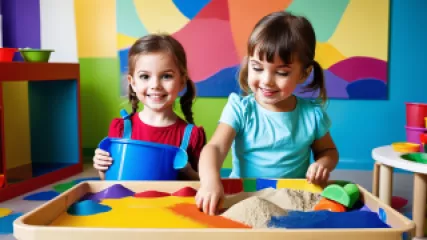Fun and Therapeutic Play Activities for Children
Welcome to our comprehensive guide on fun and therapeutic play activities for children. Play therapy is an effective approach used by therapists to help children express themselves, develop coping skills, and work through emotional challenges. By engaging in play, children can communicate their thoughts and feelings in a safe and non-threatening environment. In this article, we will explore various play therapy techniques and provide step-by-step instructions on how to implement them. Whether you are a parent, educator, or therapist, these activities can be incorporated into children's therapy sessions or used for childhood counseling online. Let's dive in!
1. Sensory Play
Sensory play activities stimulate the senses and promote cognitive, social, and emotional development. Here are a few therapeutic sensory play ideas:
- Sand Play: Create a small sandbox using a plastic container and fill it with kinetic sand or regular sand. Encourage the child to build sandcastles, make patterns, or bury small objects. This activity promotes creativity and sensory exploration.
- Water Play: Set up a water table or use a large basin filled with water. Provide containers, spoons, and cups for pouring and scooping. Water play helps children relax, improve motor skills, and develop hand-eye coordination.
- Playdough Therapy: Give the child playdough and various tools like cookie cutters, rolling pins, and plastic knives. They can mold, squeeze, and shape the playdough to express their emotions. Playdough therapy enhances fine motor skills and provides a tactile experience.
2. Art Therapy
Art therapy encourages self-expression, creativity, and emotional healing. Here are some art-based activities:
- Collage Making: Provide magazines, newspapers, scissors, and glue sticks. Ask the child to create a collage that represents their emotions or aspirations. Collage making allows children to explore their feelings and create visual narratives.
- Painting: Set up an art station with paints, brushes, and paper. Encourage the child to paint freely or create a specific scene that relates to their emotions. Painting provides a therapeutic outlet for self-expression and can be a calming activity.
- Emotion Drawings: Give the child a piece of paper and ask them to draw different facial expressions representing various emotions. This activity helps children identify and understand their feelings.
3. Role-Playing
Role-playing activities allow children to explore different scenarios and perspectives, facilitating emotional growth and empathy. Here are some therapeutic role-playing ideas:
- Puppet Shows: Provide puppets or stuffed animals and encourage the child to create a puppet show. They can act out situations or express their emotions through the characters. Puppet shows promote imagination, communication, and problem-solving skills.
- Dramatic Play: Set up a pretend play area with costumes, props, and a designated theme. The child can engage in imaginative play and act out different roles. Dramatic play encourages creativity, social interaction, and emotional exploration.
- Therapeutic Storytelling: Use storybooks or create personalized stories that address the child's specific challenges. Allow the child to participate in storytelling by adding their own ideas and interpretations. Therapeutic storytelling helps children process emotions and learn valuable life lessons.
4. Game-Based Activities
Games provide an enjoyable and structured way for children to develop social skills, problem-solving abilities, and emotional regulation. Here are some game-based therapeutic activities:
- Board Games: Choose board games that promote cooperation, turn-taking, and emotional intelligence. Games like "Feelings Bingo" or "Emotion Charades" can help children identify and express their emotions.
- Memory Games: Create a memory game using index cards. Write different emotions or coping strategies on each card and ask the child to match the pairs. This activity enhances memory skills while reinforcing emotional vocabulary.
- Feelings Jenga: Label each Jenga block with an emotion. As the child pulls out a block, they discuss a time when they felt that emotion or share a coping strategy related to it. Feelings Jenga promotes emotional awareness and communication.
Remember, these play therapy techniques are meant to be engaging and fun for children while providing therapeutic benefits. Adapt the activities to suit the child's age, interests, and specific needs. Always create a safe and supportive environment where the child feels comfortable expressing themselves. If you are unsure about implementing play therapy techniques, consider consulting a qualified play therapist or mental health professional for guidance.
We hope this guide has provided you with valuable play therapy resources and ideas for incorporating therapeutic play activities into children's therapy sessions. Remember, play is a powerful tool for healing, growth, and emotional well-being. By using these techniques, you can support children in their journey towards resilience and self-discovery. Happy playing!






